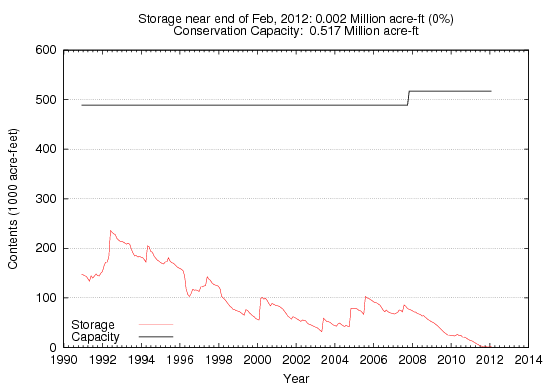Robert Lee, The Texas Town That Nearly Went Dry
This article was reported by PBS Newshour in collaboration with StateImpact Texas.
All this week we’ve been posting videos and reports from a series on the drought by PBS Newshour done in collaboration with StateImpact Texas. (And a ten-minute television segment aired Thursday night on PBS, which you can watch here.) The series is part of a larger project by PBS Newshour in partnership with local public media, Coping With Climate Change, that looks at how a transforming climate affect’s everyday life. Today’s story focuses on Robert Lee in West Texas, a town of a little over a thousand people that nearly ran dry during the drought.
John Jacobs is the proud mayor of Robert Lee, where his family has lived since the Civil War. And he’ll tell you that he’s never seen anything like this.
“We started to get concerned about 2 years ago that it was going to turn into something,” Jacobs says. “Of course, like everyone else, we thought it was going to rain.”
But it rarely did. Robert Lee relies on the E.V. Spence reservoir, which was built after the drought of record in the 1950s. But here’s what’s happened to that reservoir during the latest drought:

Map by Texas Water Development Board
Levels in the E.V. Spence reservoir have dropped drastically over the last three years.
Robert Lee is in Coke County, which received less than ten inches of rain during the drought, over twelve inches below normal.
And without that water, ranchers like Bartlett Murray are having to cut back. “If you dont have the water to water your crops,” he says, “and you dont have ample rainfall to make a crop, theres no money there. Yes, there are some government subsidies, but it’s not enough.”
Without rain, already-dry grass and brush turned into perfect kindling for the worst wildfire season in Texas history. They burned through nearly four million acres. And to put out them out, firefighters had to rely on already-strained water supplies.
“You throw a fire season that burned over 40 percent of our county — and we thank god for the Texas Forest Service — but every time they came in with one of those helicopters, or the big planes, they sucked more of our water out of Lake E.V. Spence until as you see today, its gone,” says Melinda McCuthcen, who edits the local paper and owns a ranch on the edge of town.
So what happens if there’s another fire this season with so little water left in the reservoir to fight it? “I have no idea, I really don’t,” McCutchen says. “That would be for someone else to figure out because we don’t have the water to fight another fire season like we did last year.”
As the reservoir levels dropped dramatically last year, the town went into heavy conservation mode, dropping water use by 80 percent.

Photo by PBS Newshour
A 12-mile long, $1.5 million-dollar pipeline is being constructed to bring water to Robert Lee
“I never take a bath, take a shower, or wash a load of clothes, that I don’t think, ‘Save water,'” McCutchen says. “You don’t leave the water running when you brush your teeth, all those things that maybe people living in wetter areas do, we don’t.”
But drastic conservation wasn’t enough, so the town began building a 12-mile long pipeline to a treatment plant in Bronte. That town receives some of its water from Oak Creek Reservoir. And this graph shows that reservoir has not even begun to recover:

Map by USGS
Water levels in the Oak Creek Reservoir have fallen sharply since the beginning of the drought.
The pipeline is being built at a cost of over a million dollars, using both state and federal funds. It’s been a town-wide effort, with locals rolling up their sleeves to help. “The community of Robert Lee always pulls together, and stands together,” says local Bill Hood. “We’ll come through it. We’ll be stronger.”
